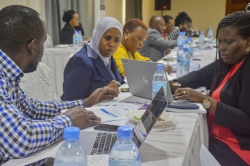
A one-day workshop was organized and conducted in Dodoma under the leadership of the Ministry of Health, Community Development, Gender, Elderly and Children (MOHCDGEC) with support from key stakeholders of Respectful Maternity Care (RMC) in Tanzania, November 22, 2021. The workshop brought together the said stakeholders to discuss one main agenda that was initiated by the MOHCDGEC on measurement of RMC related services in Tanzania. Of recent, there have been on-going discussions among the MOHCDGEC and its Implementing Partners (IPs) through the DNMS and the RCHS Directorates on accountability and how to measure RMC within the routine health system. This is a gap that the MOHCDGEC and the IPs both agree that has not been sufficiently addressed alongside the efforts to mainstream and integrate RMC interventions in routine service delivery channels. There is an opportunity to draw from efforts from various stakeholders to identify indicators that may be suitable for routine monitoring and evaluation of respectful care. The Africa Academy for Public Health (AAPH) provided the overall coordination, logistics and technical support for the workshop.
Development of the Respectful Maternity Care (RMC) agenda has received a large contribution from the global documentation of neglectful, disrespectful, and abusive care in health facilities. To date RMC is on the forefront of global discussions with regards to quality of maternity care. Similarly, the efforts have led to the recognition that the different types of mistreatments that women go through during pregnancy, childbirth and post-natal care are a form of violation of human rights. There is growing evidence that a positive experience of care leads to improved maternal and new-born outcomes [Sudhinaraset 2020, Morton 2019, Bohren 2017], while negative experiences of care have been shown to affect future care-seeking behaviours [Wassihun 2018, Moyer 2013]. Addressing disrespect and abuse is hence crucial to reducing maternal mortality and morbidity. For this reason, in 2014, WHO issued a statement calling for greater action, dialogue, research and advocacy on RMC. WHO identifies Respectful Maternity Care as the care organized for and provided to all women in a manner that maintains their dignity, privacy and confidentiality, ensures freedom from harm and mistreatment, and enables informed choice and continuous support during labor and childbirth (WHO, 2018).
Substantiated discussion about RMC in Tanzania picked pace from around 2008. This discussion has been ongoing to date, each time with specific focus. In its initial phase, the discussion was more centered on generation of evidence on existence of features within the health system that compromised the quality of care of women during labor and delivery (disrespect and abuse). This phase was followed up by a moment of “call for action” to which policy response and design of interventions to address factors against RMC were addressed. Among the main successes attained during this phase was a positive response from the Government which was climaxed by the development of the national guidelines for “Respectful and Compassionate Care (RCC) and the National guidelines for Mainstreaming and integrating gender in RMNCAH services”. Currently, the political will is firm and clear. In deed this has resulted from the MOHCDGEC taking lead of this RMC agenda.
While the wide scale implementation of RMC is taking pace, measures of RMC in routine practice are yet to be fully developed. It is from this background the said workshop was prepared in order to bring together all key stakeholders to discuss how and which indicators could be introduced, and integrated in the HMIS & DHIS2 to track and measure services for advancing RMC in Tanzania.
This was a consultative workshop with the following objectives:
- To bring together key RMC stakeholders to discuss RMC indicators that are perceived to be appropriate for Tanzania.
- To review and classify the suggested indicators that would be recommended for incorporation into HMIS.
- To develop a way forward for incorporation of the indicators into DHIS2.
The workshop brought together stakeholders who have an experience in the area of indicators for RMC through their lines of work. It also included various Government departments that have direct or indirect involvement in policy and decision making on health data, handling and managing health information or supervisory role in processing and use of health information systems and data. It therefore targeted very specific participants who are known to have potential contribution to the discussion. A total of 32 participants representing 8 institutions attended.
With the leadership of the DNMS – MOHCDGEC, the HEARD consortium had prepared resources to be used to initiate discussion on RMC indicators (Appendix 2a and 2b). Other participating implementing partners were also invited to provide their own resources based on their own experience of implementing and measuring RMC through their various projects and/or activities.
This workshop provided a prioritized list and implementation plan/ideas for measuring RMC service provision that selected for integration into routine HMIS/DHIS-2 indicators.
